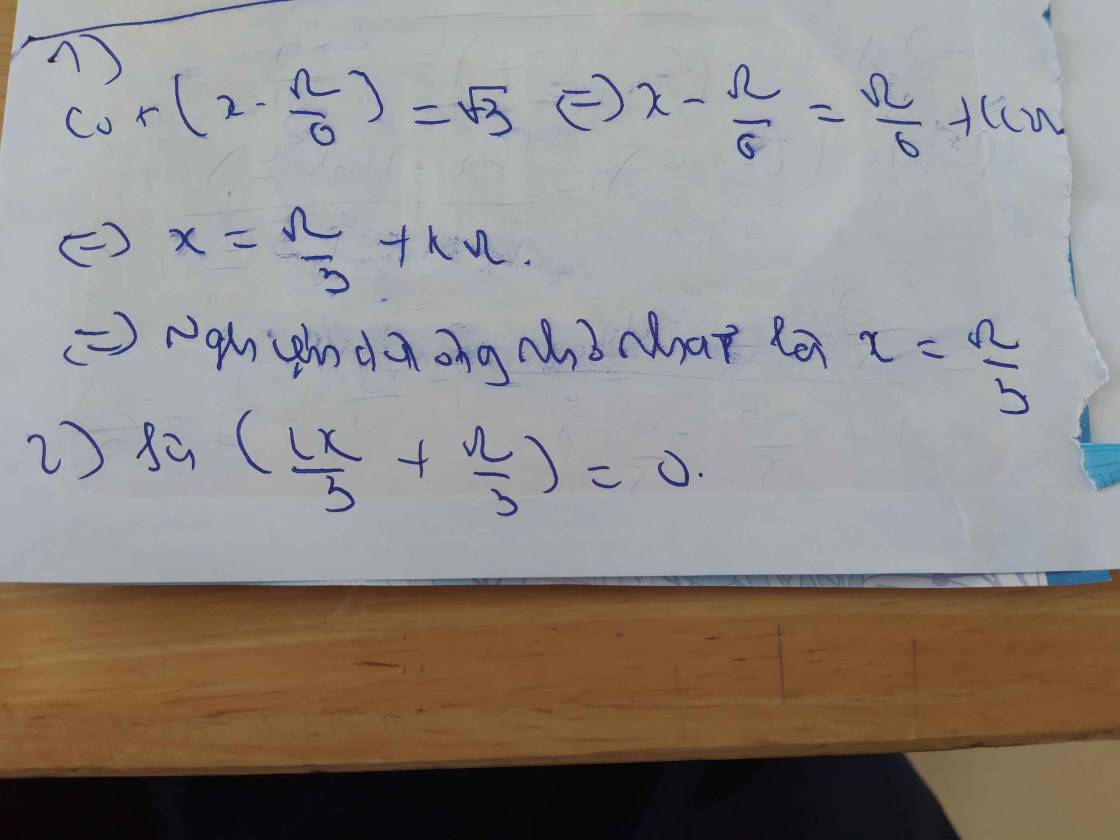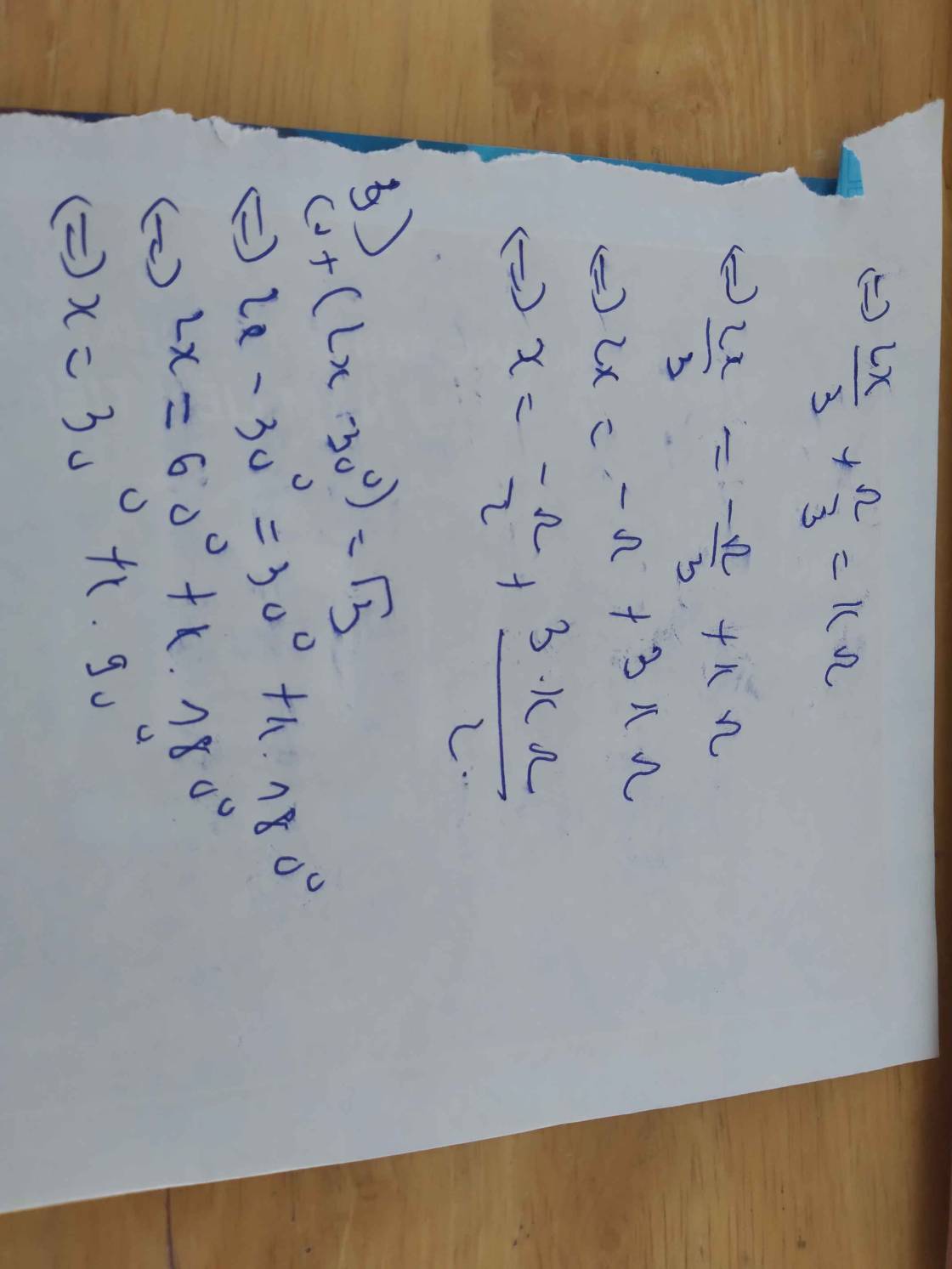Phương trình \(sin\left(x^2-5x\right)=\dfrac{-\sqrt{3}}{2}\) có bao nhiêu nghiệm thuộc \(\left[0;\dfrac{\pi}{2}\right]\)

Những câu hỏi liên quan
1) nghiệm dương nhỏ nhất của phương trình \(cot\left(x-\dfrac{\pi}{6}\right)=\sqrt{3}\) là
2) phương trình \(sin\left(\dfrac{2x}{3}+\dfrac{\pi}{3}\right)=0\) có nghiệm là
3) họ nghiệm của phương trình \(cot\)(2x - 30 độ) = \(\sqrt{3}\) là
Phương trình \(\sqrt{2}\left(\sin x+\cos x\right)-\sin x\cos x=1\)có bao nhiêu nghiệm thuộc \(\left(0;2\pi\right)\)
ta có \(\hept{\begin{cases}\sqrt{2}\left(sinx+cosx\right)=2sin\left(x+\frac{\pi}{4}\right)\\sinx.cosx=\frac{1}{2}sin2x=-\frac{1}{2}cos\left(2x+\frac{\pi}{2}\right)=-\frac{1-2sin^2\left(x+\frac{\pi}{3}\right)}{2}\end{cases}}\)
Vậy phương trình \(\Leftrightarrow2sin\left(x+\frac{\pi}{4}\right)+\frac{1-2sin^2\left(x+\frac{\pi}{4}\right)}{2}=1\)
Đặt \(sin\left(x+\frac{\pi}{4}\right)=a\Rightarrow PT\Leftrightarrow2a+\frac{1-2a^2}{2}=1\Leftrightarrow\orbr{\begin{cases}a=1+\frac{1}{\sqrt{2}}\\a=1-\frac{1}{\sqrt{2}}\end{cases}}\)
vì sin <1 nên \(sin\left(x+\frac{\pi}{4}\right)=1-\frac{1}{\sqrt{2}}\)có 4 nghiệm trên \(\left(0,2\pi\right)\)
Cho phương trình ẩn x : \(^{x^2-5x+m-2=0\left(1\right)}\)
a.Giải phương trình (1) khi m=-4
b.Tìm m để phương trình (1) có hai nghiệm dương phân biệt \(_{x_1,_{ }x_2}\)thỏa mãn hệ thức \(2\left(\dfrac{1}{\sqrt{x_1}}+\dfrac{1}{\sqrt{x_2}}\right)=3\)
a. thay m=-4 vào (1) ta có:
\(x^2-5x-6=0\)
Δ=b\(^2\)-4ac= (-5)\(^2\) - 4.1.(-6)= 25 + 24= 49 > 0
\(\sqrt{\Delta}=\sqrt{49}=7\)
x\(_1\)=\(\dfrac{-b+\sqrt{\Delta}}{2a}=\dfrac{5+7}{2}\)=6
x\(_2\)=\(\dfrac{-b-\sqrt{\Delta}}{2a}=\dfrac{5-7}{2}\)=-1
vậy khi x=-4 thì pt đã cho có 2 nghiệm x\(_1\)=6; x\(_2\)=-1
Đúng 2
Bình luận (0)
Giải phương trình:
\(sin3x-cos3x-\sqrt{2}sin\left(5x-\dfrac{\pi}{3}\right)=0\)
\(\Rightarrow\sqrt{2}.sin\left(3x-\dfrac{\pi}{4}\right)-\sqrt{2}.sin\left(5x-\dfrac{\pi}{3}\right)=0\Leftrightarrow sin\left(3x-\dfrac{\pi}{4}\right)=sin\left(5x-\dfrac{\pi}{3}\right)\)
\(\Leftrightarrow\left[{}\begin{matrix}3x-\dfrac{\pi}{4}+k2\pi=5x-\dfrac{\pi}{3}\\\pi-3x+\dfrac{\pi}{4}+k2\pi=5x-\dfrac{\pi}{3}\end{matrix}\right.\)
\(\left[{}\begin{matrix}x=\dfrac{\pi}{12}+k\pi\\x=\dfrac{19\pi}{96}+\dfrac{k\pi}{4}\end{matrix}\right.\); k\(\in Z\)
Đúng 1
Bình luận (0)
c1: Rút gọn biểu thức A=\(\left(\dfrac{1}{x-2\sqrt{x}}-\dfrac{2}{6-3\sqrt{x}}\right):\left(\dfrac{2}{3}+\dfrac{1}{\sqrt{x}}\right)\)
c2: Cho phương trình: \(x^2-2\left(2m-1\right)x+m^2-4m=0\left(1\right)\)
Tìm m để phương trình (1) có hai nghiệm phân biệt x1, x2 thoả mãn hệ thức \(x_1+x_2=\dfrac{-8}{x_1+x_2}\)
1:
\(=\left(\dfrac{1}{x-2\sqrt{x}}+\dfrac{2}{3\sqrt{x}-6}\right):\dfrac{2\sqrt{x}+3}{3\sqrt{x}}\)
\(=\dfrac{3+2\sqrt{x}}{3\sqrt{x}\left(\sqrt{x}-2\right)}\cdot\dfrac{3\sqrt{x}}{2\sqrt{x}+3}=\dfrac{1}{\sqrt{x}-2}\)
Đúng 0
Bình luận (0)
Nghiệm của phương trình \(sin^4x+cos^4x+cos\left(x-\dfrac{\pi}{4}\right).sin\left(3x-\dfrac{\pi}{4}\right)-\dfrac{3}{2}=0\)
\(\Leftrightarrow\left(sin^2x+cos^2x\right)^2-2sin^2x.cos^2x+\dfrac{1}{2}sin\left(4x-\dfrac{\pi}{2}\right)+\dfrac{1}{2}sin2x-\dfrac{3}{2}=0\)
\(\Leftrightarrow1-\dfrac{1}{2}sin^22x-\dfrac{1}{2}cos4x+\dfrac{1}{2}sin2x-\dfrac{3}{2}=0\)
\(\Leftrightarrow1-\dfrac{1}{2}\left(\dfrac{1-cos4x}{2}\right)-\dfrac{1}{2}cos4x+\dfrac{1}{2}sin2x-\dfrac{3}{2}=0\)
\(\Leftrightarrow-\dfrac{3}{4}-\dfrac{1}{4}cos4x+\dfrac{1}{2}sin2x=0\)
\(\Leftrightarrow-\dfrac{3}{4}-\dfrac{1}{4}\left(1-2sin^22x\right)+\dfrac{1}{2}sin2x=0\)
\(\Leftrightarrow...\)
Đúng 2
Bình luận (0)
1. Giải các phương trình sau:
a) \(\cos\left(x+15^0\right)=\dfrac{2}{5}\)
b) \(\cot\left(2x-10^0\right)=4\)
c) \(\cos\left(x+12^0\right)+\sin\left(78^0-x\right)=1\)
2. Định m để các phương trình sau có nghiệm:
\(\sin\left(3x-27^0\right)=2m^2+m\)
c.
\(\Leftrightarrow cos\left(x+12^0\right)+cos\left(90^0-78^0+x\right)=1\)
\(\Leftrightarrow2cos\left(x+12^0\right)=1\)
\(\Leftrightarrow cos\left(x+12^0\right)=\dfrac{1}{2}\)
\(\Leftrightarrow\left[{}\begin{matrix}x+12^0=60^0+k360^0\\x+12^0=-60^0+k360^0\end{matrix}\right.\)
\(\Rightarrow\left[{}\begin{matrix}x=48^0+k360^0\\x=-72^0+k360^0\end{matrix}\right.\)
2.
Do \(-1\le sin\left(3x-27^0\right)\le1\) nên pt có nghiệm khi:
\(\left\{{}\begin{matrix}2m^2+m\ge-1\\2m^2+m\le1\end{matrix}\right.\) \(\Leftrightarrow\left\{{}\begin{matrix}2m^2+m+1\ge0\left(luôn-đúng\right)\\2m^2+m-1\le0\end{matrix}\right.\)
\(\Rightarrow-1\le m\le\dfrac{1}{2}\)
Đúng 2
Bình luận (0)
a.
\(\Rightarrow\left[{}\begin{matrix}x+15^0=arccos\left(\dfrac{2}{5}\right)+k360^0\\x+15^0=-arccos\left(\dfrac{2}{5}\right)+k360^0\end{matrix}\right.\)
\(\Rightarrow\left[{}\begin{matrix}x=-15^0+arccos\left(\dfrac{2}{5}\right)+k360^0\\x=-15^0-arccos\left(\dfrac{2}{5}\right)+k360^0\end{matrix}\right.\)
b.
\(2x-10^0=arccot\left(4\right)+k180^0\)
\(\Rightarrow x=5^0+\dfrac{1}{2}arccot\left(4\right)+k90^0\)
Đúng 1
Bình luận (0)
2.
Phương trình \(sin\left(3x-27^o\right)=2m^2+m\) có nghiệm khi:
\(2m^2+m\in\left[-1;1\right]\)
\(\Leftrightarrow\left\{{}\begin{matrix}2m^2+m\le1\\2m^2+m\ge-1\end{matrix}\right.\)
\(\Leftrightarrow\left(m+1\right)\left(2m-1\right)\le0\)
\(\Leftrightarrow-1\le m\le\dfrac{1}{2}\)
Đúng 1
Bình luận (0)
Giải các phương trình sau:
a) \(2sin\left(x+\dfrac{\pi}{5}\right)+\sqrt{3}=0\)
b)\(sin\left(2x-50\text{°}\right)=\dfrac{\sqrt{3}}{2}\)
c)\(\sqrt{3}tan\left(2x-\dfrac{\pi}{3}\right)-1=0\)
a: \(2\cdot sin\left(x+\dfrac{\Omega}{5}\right)+\sqrt{3}=0\)
=>\(2\cdot sin\left(x+\dfrac{\Omega}{5}\right)=-\sqrt{3}\)
=>\(sin\left(x+\dfrac{\Omega}{5}\right)=-\dfrac{\sqrt{3}}{2}\)
=>\(\left[{}\begin{matrix}x+\dfrac{\Omega}{5}=-\dfrac{\Omega}{3}+k2\Omega\\x+\dfrac{\Omega}{5}=\dfrac{4}{3}\Omega+k2\Omega\end{matrix}\right.\)
=>\(\left[{}\begin{matrix}x=-\dfrac{8}{15}\Omega+k2\Omega\\x=\dfrac{4}{3}\Omega-\dfrac{\Omega}{5}+k2\Omega=\dfrac{17}{15}\Omega+k2\Omega\end{matrix}\right.\)
b: \(sin\left(2x-50^0\right)=\dfrac{\sqrt{3}}{2}\)
=>\(\left[{}\begin{matrix}2x-50^0=60^0+k\cdot360^0\\2x-50^0=300^0+k\cdot360^0\end{matrix}\right.\)
=>\(\left[{}\begin{matrix}2x=110^0+k\cdot360^0\\2x=350^0+k\cdot360^0\end{matrix}\right.\)
=>\(\left[{}\begin{matrix}x=55^0+k\cdot180^0\\x=175^0+k\cdot180^0\end{matrix}\right.\)
c: \(\sqrt{3}\cdot tan\left(2x-\dfrac{\Omega}{3}\right)-1=0\)
=>\(\sqrt{3}\cdot tan\left(2x-\dfrac{\Omega}{3}\right)=1\)
=>\(tan\left(2x-\dfrac{\Omega}{3}\right)=\dfrac{1}{\sqrt{3}}\)
=>\(2x-\dfrac{\Omega}{3}=\dfrac{\Omega}{6}+k2\Omega\)
=>\(2x=\dfrac{1}{2}\Omega+k2\Omega\)
=>\(x=\dfrac{1}{4}\Omega+k\Omega\)
Đúng 1
Bình luận (1)
cho phương trình \(2cos2x+sin^2xcosx+sinxcos^2x=m\left(sinx+cosx\right)\)tìm m để phương trình có ít nhất 1 nghiệm thuộc đoạn\(\left[0;\dfrac{\Pi}{2}\right]\)
\(\Leftrightarrow2\left(cos^2x-sin^2x\right)+sinx.cosx\left(sinx+cosx\right)=m\left(sinx+cosx\right)\)
\(\Leftrightarrow\left(2cosx-2sinx\right)\left(sinx+cosx\right)+sinx.cosx\left(sinx+cosx\right)=m\left(sinx+cosx\right)\)
\(\Leftrightarrow\left[{}\begin{matrix}sinx+cosx=0\left(\text{vô nghiệm trên đoạn xét}\right)\\2cosx-2sinx+sinx.cosx=m\left(1\right)\end{matrix}\right.\)
Xét (1), đặt \(t=cosx-sinx=\sqrt{2}cos\left(x+\dfrac{\pi}{4}\right)\)
\(\Rightarrow\left\{{}\begin{matrix}t\in\left[-1;1\right]\\sinx.cosx=\dfrac{1-t^2}{2}\end{matrix}\right.\)
\(\left(1\right)\Leftrightarrow2t+\dfrac{1-t^2}{2}=m\)
Xét hàm \(f\left(t\right)=-\dfrac{1}{2}t^2+2t+\dfrac{1}{2}\) trên \(\left[-1;1\right]\)
\(-\dfrac{b}{2a}=2\notin\left[-1;1\right]\) ; \(f\left(-1\right)=-2\) ; \(f\left(1\right)=2\)
\(\Rightarrow-2\le f\left(t\right)\le2\Rightarrow-2\le m\le2\)
Đúng 0
Bình luận (0)






















